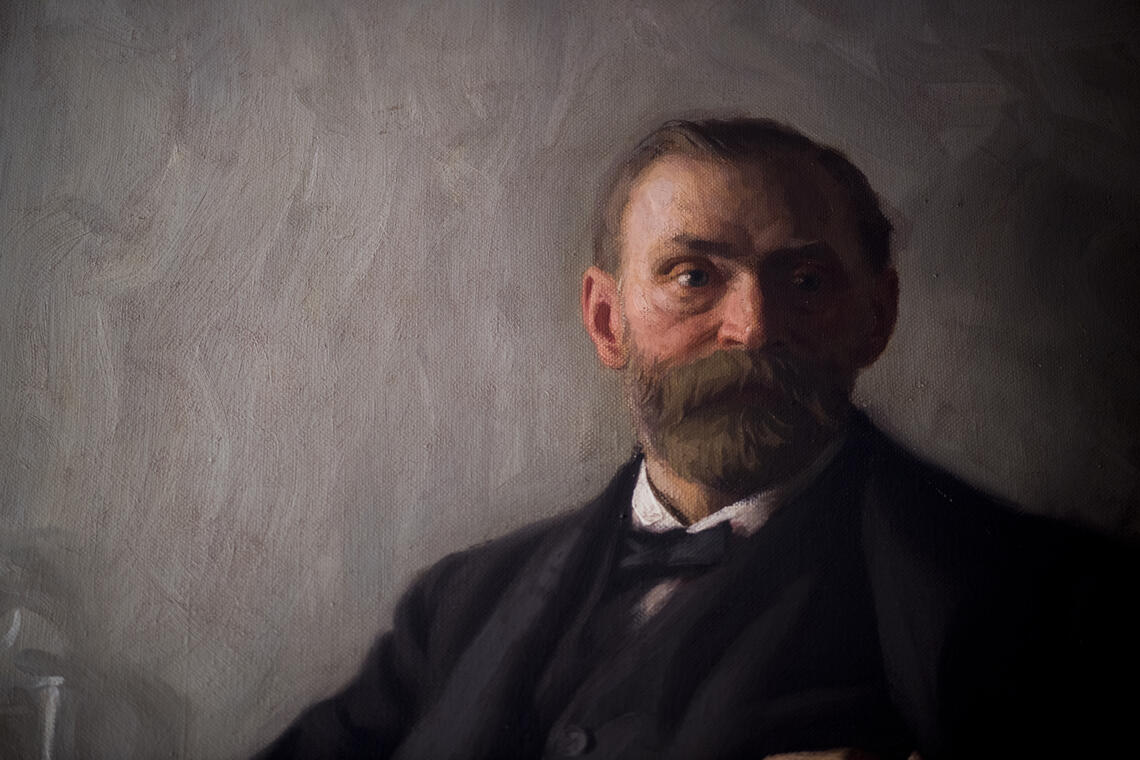Alfred Nobel

Alfred Nobel's family descended from Olof Rudbeck, the most famous scientist in Sweden in the 17th century. Alfred was fluent in several languages.
Alfred Bernhard Nobel was born in Stockholm on 21 October 1833. The menfolk of the family were engineers and businessmen. In 1842, Alfred moved with his mother and brothers to St. Petersburg, where his father Immanuel Nobel had opened an armaments factory a few years prior. He manufactured landmines for the Tsar's army, and made good profits. Alfred did not attend school but received private tutoring from good teachers. He was quick to master four foreign languages, and showed great ability in the natural sciences, especially chemistry.
The end of the Crimean War in 1856 had unfortunate results for Immanuel Nobel and his family: the factory went bankrupt. The parents and their youngest son Emil returned home to Sweden; the three older boys stayed in St. Petersburg to see if they could get the business back on a sound footing. It was at this time that Alfred Nobel began to take an interest in nitroglycerine - an extremely explosive liquid invented by the Italian Ascanio Sobrero. Nobel saw that there was a lot of money to be made from industrial exploitation of the explosive, provided a safer way could be found of handling it. In 1863, after extensive experimentation, he came up with a promising blend of nitroglycerine and black powder, which he marketed as "blasting oil". On it he obtained the first of a total of 355 patents. It marked the first step on the road to what was to prove his greatest success: the invention of dynamite.
Alfred Nobel patented the nitroglycerine-based explosive dynamite in 1867. In the following year, he received an honorary award from the Royal Swedish Academy of Sciences for "important inventions for the practical use of mankind". He was extremely proud of that prize. The experience was certainly an important source of inspiration for the science prizes he was later to establish in his own name.
By this time Alfred Nobel was already establishing himself as a successful industrialist and businessman, first in Europe and then in the USA. Despite several setbacks - the most tragic was the disastrous explosion at Nobel's explosives factory in Stockholm in 1864 which cost his younger brother Emil his life - he gradually became one of the wealthiest men of his day.
As an inventor and man of business, Alfred Nobel was both determined and confident. On the personal level however, he was modest, almost shy. He has been described as a lonely and restless brooder who was often ill, who never wanted or had the opportunity to found a family of his own. He could be tough and cynical in his business dealings, and was in his own words at the same time both a misanthrope and a "superidealist". He loved literature, had written poems and a play in his earlier years, and built up a large book collection. Here lay the seeds of his decision to set up a literature prize to be awarded to the author of the best work "of an idealistic tendency".
But his idealism also had a political aspect: Alfred Nobel supported those who spoke up against militarism and war, and wanted to make a contribution to work for disarmament and the peaceful solution of international conflicts. In this respect, the Austrian author and peace activist Bertha von Suttner exercised considerable influence on him. They were close friends and corresponded for many years. There is reason to believe that the establishment of the Nobel Peace Prize was principally inspired by her.
It took Alfred Nobel several years to complete the drawing up of his will. The final version, dated 27 November 1895, laid down that the bulk of his immense fortune should be reserved for a fund for the financing of annual honorary awards to be made in the fields of physics, chemistry, medicine or physiology, literature and peace.
The contents of the will only became known after his death.
Alfred Nobel lived much of his adult life in Paris. In 1891 he moved to San Remo, Italy. A few years later, he bought the Bofors ironworks and armaments factories, had a splendid mansion erected in Karlskoga, and gradually prepared to move home to Sweden for good, despite a hearty dislike of the Nordic winter. That is not how things turned out, however. On December 10, 1896, Alfred Nobel died suddenly in his home in San Remo.